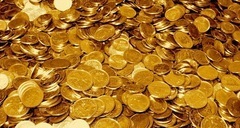Gold is the same as paper

We won’t return to a gold standard because changing to a fiat currency was one of the great innovations of modern economics. You aren’t literally and figuratively weighed down by gold, and that allows central banks and governments to set policy that allows them to rebound from crises, spur growth, and lift people out of poverty and short lifespans. As Liaquat Ahamed points out, the gold standard is also a sure way to get yourself in a deflationary cycle.
But, wait! gold bugs will say. That paper isn’t worth the paper it’s printed on. Gold has real value, that’s why it was the world’s currency for many years. The problem with this is that money is a turtles-all-the-way-down concept. Gold is just as much a pointer to value as paper is, except it has many more downsides: it’s heavier, more cumbersome to exchange, and has a fixed supply.
Gold isn’t valuable in and of itself. You can’t live in gold. You can’t eat gold. You can’t clothe yourself in gold. A gold coin can’t paint your house, or build you a website. You could (hypothetically) use it to put your kids through college, so it that sense it’s valuable to you, but only in its exchange, because on the other end, the trustees and professors and janitors at the college need to live somewhere, eat something, wear something, and have websites built. And again they exchange it for those goods and services. So really the only thing that’s intrinsic to this little economy I’ve just described is the fact that you, the college trustees, the service providers, et al., all agree on the value or rate of exchange. It’s like an algebraic equation where constants cancel out — gold is the constant, so we can abstract it away. It may as well be “neighborhood fun bucks,” so long as everyone agrees on the rate of exchange for goods and services.
And there you have it. Economies have nothing to do with the particulars of their currencies, and everything to do with people and institutions trusting that, in exchange for some amount, I will receive something of perceived equal value. Trust, and perception. Currencies are just a convenient means by which we mitigate that exchange, an abstraction, a stand-in for a hypothetical exchange, ultimately, an exchange built on trust.
Interestingly, the only inherent value gold has is in its use as jewelry. Which, aside from any aesthetic concerns, couldn’t be more appropriate for our discussion, because people wear gold jewelry as a signifier of wealth. A pointer, a marker, an abstraction for the wealth itself, which, again, is just the potential for exchange.
It is this essential trust network at the core of economics that explains why there is so much noise about gold. It reflects a lack of trust on the part of gold advocates in our central banking and governmental institutions, which they feel pursue policies that aren’t in their interest, or are in the interest of undeserving populations. The switch to a gold standard, therefore, has nothing to do with inflation or any other “economic” concern, and everything to do with pursuing a political objective. The market of exchange in this little political economy is for ideas about reprioritizing our institutions. Which is a legitimate topic of national debate. But reverting to the gold standard, as a practical economic matter, would be bonkers.